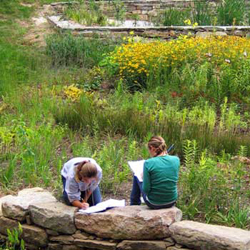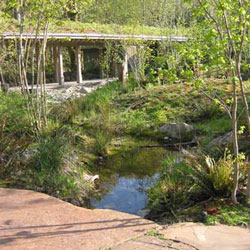Professional Practice
Children: ADD and ADHD

Kids can’t concentrate? Give them a dose of nature. Research shows a 20 minute walk in a park or natural setting will enhance their ability to focus. Journal of Attention Disorders, 2009
According to the Centers for Disease Control and Prevention, the percentage of children with parent-reported ADHD diagnosis increased by 22 percent between 2003 and 2007, with an average of 3 percent per year increase between 1997-2006 and an average 5.5 percent increase from 2003-2007.
How Nature Helps
Researchers at the University of Illinois Urbana-Champaign show that children diagnosed with ADD/ADHD concentrate better and have a general reduction of symptoms after spending time in nature. This dose of green doesn't need to be a major excursion - benefits have been seen in a simple walk down a tree-lined street. Interestingly, however, children suffering from ADHD do best in open green spaces with less canopy cover.
 Sidwell Friends School, Washington, D.C. / Image credit: Andropogon Associates
Sidwell Friends School, Washington, D.C. / Image credit: Andropogon Associates ASLA Professional 2004 General Design Honor Award, Cedar River Watershed Education Center, Seattle, Washington, Jones & Jones Architects and Landscape Architects, Ltd. / Image credit: Nancy Rottle
ASLA Professional 2004 General Design Honor Award, Cedar River Watershed Education Center, Seattle, Washington, Jones & Jones Architects and Landscape Architects, Ltd. / Image credit: Nancy RottleResearch
"A Potential Natural Treatment for Attention-Deficit/Hyperactivity Disorder: Evidence From a National Study," American Journal of Public Health, 2004
"Children with Attention Deficits Concentrate Better After Walk in the Park," Journal of Attention Disorders, 2009
"Could Exposure to Everyday Green Spaces Help Treat ADHD? Evidence from Children's Play Settings," Applied Psychology: Health and Well-Being, 2011
“Coping with ADD: The Surprising Connection to Green Play Settings,” Environment and Behavior, 2001
Resources
"For Kids with ADHD, Regular ‘Green Time’ is Linked to Milder Symptoms," University of Illinois Urbana-Champaign
Organizations
National Environmental Education Foundation
The Student Conservation Association
Outdoor Nation
Role of the Landscape Architect
Landscape architects design school settings, like Sidwell Friends School in Washington, D.C., that are both integrated into their surrounding landscapes as well as provide spaces for outdoor learning and play in the children’s day to day lives.
Children with ADD/ADHD respond positively to time spent outside, and urban parks like The Yards, also in Washington, DC, provide a place for kids to splash in the water and run on the lawns.
Case Studies
Sidwell Friends School, Washington, D.C., Andropogon Associates
Cedar River Watershed Education Center, Seattle, Washington, Jones & Jones Architects and Landscape Architects, Ltd.
<< Home
Autism Spectrum Disorders >>